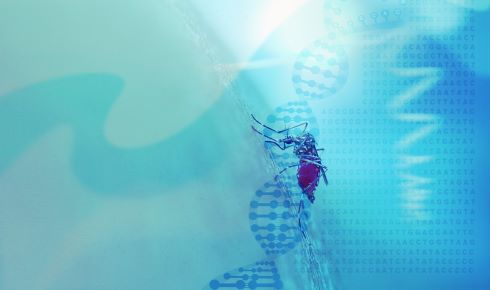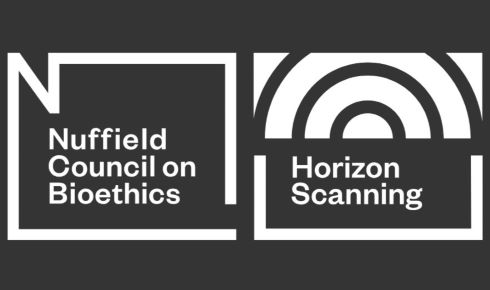‘Life science is raising new ethical questions, at unprecedented pace'

21 February 2025
Nuffield Council on Bioethics director Danielle Hamm tells us about the latest horizon scan and its first attempt to ‘timeframe’ potential issues
The Nuffield Council on Bioethics is the only independent organisation in the UK dedicated to identifying, analysing and advising on ethical issues arising from biomedicine and healthcare.
Danielle Hamm has been its director since 2021. Having studied philosophy and worked as a care assistant in a nursing home, Hamm originally considered a career in nursing. However, her interest in the ethics of medical care led her into a career in policy, working at various organisations including Compassion in Dying and the British Medical Association, and leading work on mitochondrial donation at the Human Fertilisation and Embryology Authority (HFEA).
The Nuffield Council on Bioethics has published an annual horizon scan since 2019, using insights gathered through its work to highlight where developments in biomedicine and health may have ethical implications. Shortly after the publication of its latest horizon scan, Hamm spoke to The Biologist editor Tom Ireland about how the organisation identifies issues that may be as yet unknown, unforeseen or far off in the future, and what happens when issues are identified.
Hi, Danielle. How do you go about ‘scanning the horizon’ for future ethical issues?
Well, it’s in part future studies, which has its own methodology but is notoriously difficult to get right, especially very far into the future. Our approach is multi-method, starting with desk-based research on what’s already in the literature, and also surveying and putting out a call for data to numerous organisations, from the HFEA to the OECD [Organisation for Economic Co-operation and Development], and other bioethics and scientific institutions. We convene scientists and specialists, and try to pick up emergent themes that aren't necessarily formalised in literature yet. That’s a big part of it and is quite time and resource intensive.
There are lots of issues identified in your latest horizon scan as requiring attention or action – some very broad and obvious, others much more niche and unpredictable. What happens now?
The horizon scan helps us identify issues that we will explore in more depth. It is also useful for others who are thinking about this sort of thing. For example, in our reproduction, parent and family priority area we ran two or three further horizon-scanning workshops with people in that area. Following those broad conversations we decided to prioritise work around stem cell-based embryo models (SCBEMs). This was down to a mix of where the science was, the lack of any formal or even informal governance, and the impact it was having on the scientific community in terms of knowing where the boundaries were.
 Neural organoids are in the ‘medium’ timeframe of the 2024 horizon scan. Images courtesy of the Lancaster Lab at the MRC Laboratory of Molecular Biology.
Neural organoids are in the ‘medium’ timeframe of the 2024 horizon scan. Images courtesy of the Lancaster Lab at the MRC Laboratory of Molecular Biology.
There’s a limit to what we can actually do as an organisation because we’re quite small. So we think about where we can really add the most value in certain areas. In both SCBEMs and engineering biology there is an underlying theme – questions around what good, agile, proportionate governance looks like. So we look for those bits of space where we’ve got something unique to add.
We bring an independent, non-partisan view of these topics, looking at them from all angles, which with the best will in the world is not something you can do if you’re purely a group of researchers or campaigners.
Tell us about the latest horizon scan and some of the work that has gone into it.
This year we decided to really put more resources into and focus on our horizon scan, because we know it is a benefit to the wider community. As well as the analysis of research literature, it was informed by over 50 workshops, conferences, roundtables and conversations, and a survey sent to 55 organisations and 69 individual specialists. The main change this year is to ‘timeframe’ it, categorising the topics into short, medium and long term.
It’s not just about when these issues will come to the fore. Our foresight team assessed each topic for political context, regulatory concerns, funding, and level of public interest or volition for change. A topic that scores highly across all those parameters is placed into the ‘short’ timeframe, meaning we believe there are signs to suggest it could raise ethical implications in the UK in less than five years.
Being the first time we’ve done this, we expected it to be a learning curve and for lots of people to disagree with our classifications, but we’ve actually received lots of incredibly positive feedback.
This year we have also made a point of highlighting cross-cutting themes [see below] and how they apply to our priority areas and beyond.
• Health inequalities and equity
• Wellbeing of future generations
• Dual-use technologies and research
• (Mission-driven innovation)
• Best interests and autonomy
Do you think biologists are generally good at thinking through the ethical implications of their work?
That’s difficult to answer, because I tend to only meet the ones who are very engaged with these issues, but in my experience scientists do tend to contribute willingly to what we’re doing. They use the ethical frameworks we produce and we get good feedback on them.
There is also always an element of discourse around ethics being a barrier or seen as a tick-box exercise, especially in terms of the requirements of research ethics committees. I also think a lot of people think ethically, but don’t necessarily articulate or categorise that thinking as ethics.
What about policymakers? Elsewhere in this issue (see p30), Sir Ian Boyd paints a rather scathing view of what it’s like trying to ensure complex scientific evidence is taken on by the political system. Are policymakers receptive to your work and recommendations?
The nature of the political system does facilitate a sort of short-term thinking and there is undoubtedly a lot of ‘what’s in it for me?’ among politicians. As ethicists we don’t have many political levers either – but much of our work does get good traction. A good example is the Precision Breeding Act 2023: both the minister and the opposition spokesman held up a copy of our report at the despatch box as the Act was being debated and essentially said MPs needed to draw on it because we had looked at [the issue] from all angles. We did influence the Precision Breeding Act to ensure greater flexibility in the regulation and give animal welfare more prominence.
I think we are quite useful to politicians in terms of helping them navigate really knotty issues that they don’t have the time or capabilities to think through from all angles – and the fact that we’re non-partisan and multi-disciplinary helps too.
 Gene drive technology has been flagged as a long term topic to watch
Gene drive technology has been flagged as a long term topic to watch
Finally, is bioscience getting more ethically problematic? Is your work to identify and analyse ethical issues in biomedical science getting more complex and difficult?
The short answer is yes. If you look at the explosion of genomics, and all the different agencies and institutions that are working on various aspects of that, there are many ethical components to think about ahead.
A lot of the time, ethical issues are a variation of an age-old question, such as choice – in assisted dying or abortion. But I think that there are things developing in life science now – engineering biology, organoids, new technologies – that are raising new questions, in multiple areas, and at a pace that is unique in recent history.
 See the Nuffield Council on Bioethics' Horizon Scan 2024 for more information on all 51 topics identified as requiring discussion or action.
See the Nuffield Council on Bioethics' Horizon Scan 2024 for more information on all 51 topics identified as requiring discussion or action.
Danielle Hamm is director of the Nuffield Council on Bioethics


